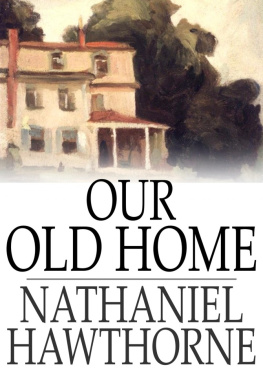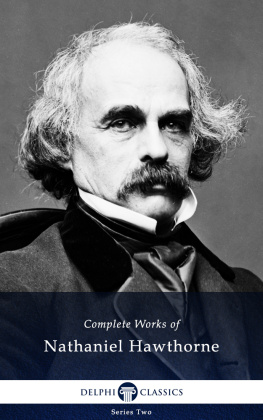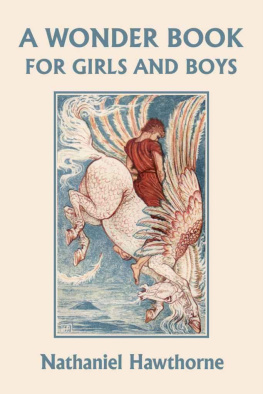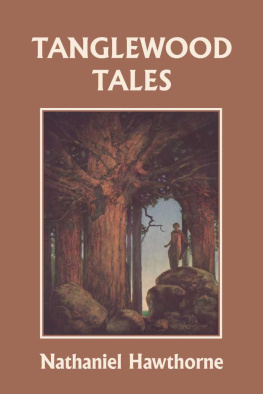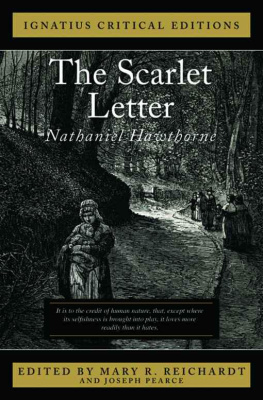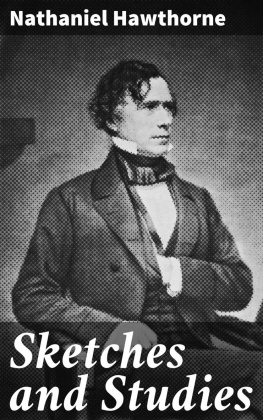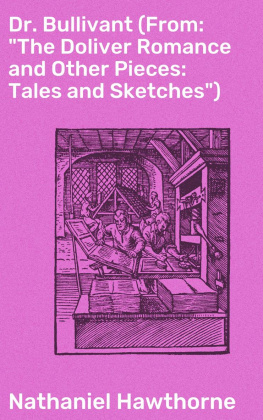Nathaniel Hawthorne - Our Old Home: A Series of English Sketches
Here you can read online Nathaniel Hawthorne - Our Old Home: A Series of English Sketches full text of the book (entire story) in english for free. Download pdf and epub, get meaning, cover and reviews about this ebook. year: 2016, publisher: The Floating Press, genre: Detective and thriller. Description of the work, (preface) as well as reviews are available. Best literature library LitArk.com created for fans of good reading and offers a wide selection of genres:
Romance novel
Science fiction
Adventure
Detective
Science
History
Home and family
Prose
Art
Politics
Computer
Non-fiction
Religion
Business
Children
Humor
Choose a favorite category and find really read worthwhile books. Enjoy immersion in the world of imagination, feel the emotions of the characters or learn something new for yourself, make an fascinating discovery.
- Book:Our Old Home: A Series of English Sketches
- Author:
- Publisher:The Floating Press
- Genre:
- Year:2016
- Rating:3 / 5
- Favourites:Add to favourites
- Your mark:
- 60
- 1
- 2
- 3
- 4
- 5
Our Old Home: A Series of English Sketches: summary, description and annotation
We offer to read an annotation, description, summary or preface (depends on what the author of the book "Our Old Home: A Series of English Sketches" wrote himself). If you haven't found the necessary information about the book — write in the comments, we will try to find it.
Though he is now regarded as one of the masters of American literature, Nathaniel Hawthorne spent a sizable chunk of his peak writing years living in England. This volume collects a series of essays and sketches that Hawthorne penned during his stay abroad. They offer keen insight into the differences between the two cultures and the ultimately illusory nature of the idea of home.
Our Old Home: A Series of English Sketches — read online for free the complete book (whole text) full work
Below is the text of the book, divided by pages. System saving the place of the last page read, allows you to conveniently read the book "Our Old Home: A Series of English Sketches" online for free, without having to search again every time where you left off. Put a bookmark, and you can go to the page where you finished reading at any time.
Font size:
Interval:
Bookmark:

A Series of English Sketches
First published in 1863
Epub ISBN 978-1-77659-737-6
Also available:
PDF ISBN 978-1-77659-738-3
2014 The Floating Press and its licensors. All rights reserved.
While every effort has been used to ensure the accuracy and reliability of the information contained in The Floating Press edition of this book, The Floating Press does not assume liability or responsibility for any errors or omissions in this book. The Floating Press does not accept responsibility for loss suffered as a result of reliance upon the accuracy or currency of information contained in this book. Do not use while operating a motor vehicle or heavy equipment. Many suitcases look alike.
Visit www.thefloatingpress.com
To Franklin Pierce,
As a Slight Memorial of a College Friendship, prolonged through Manhood,and retaining all its Vitality in our Autumnal Years,
This Volume is inscribed by NATHANIEL HAWTHORNE.
I have not asked your consent, my dear General, to the foregoinginscription, because it would have been no inconsiderable disappointmentto me had you withheld it; for I have long desired to connect your namewith some book of mine, in commemoration of an early friendship that hasgrown old between two individuals of widely dissimilar pursuits andfortunes. I only wish that the offering were a worthier one than thisvolume of sketches, which certainly are not of a kind likely to proveinteresting to a statesman in retirement, inasmuch as they meddle with nomatters of policy or government, and have very little to say about thedeeper traits of national character. In their humble way, they belongentirely to aesthetic literature, and can achieve no higher success thanto represent to the American reader a few of the external aspects ofEnglish scenery and life, especially those that are touched with theantique charm to which our countrymen are more susceptible than are thepeople among whom it is of native growth.
I once hoped, indeed, that so slight a volume would not be all that Imight write. These and other sketches, with which, in a somewhat rougherform than I have given them here, my journal was copiously filled, wereintended for the side-scenes and backgrounds and exterior adornment of awork of fiction of which the plan had imperfectly developed itself in mymind, and into which I ambitiously proposed to convey more of variousmodes of truth than I could have grasped by a direct effort. Of course,I should not mention this abortive project, only that it has been utterlythrown aside and will never now be accomplished. The Present, theImmediate, the Actual, has proved too potent for me. It takes away notonly my scanty faculty, but even my desire for imaginative composition,and leaves me sadly content to scatter a thousand peaceful fantasies uponthe hurricane that is sweeping us all along with it, possibly, into aLimbo where our nation and its polity may be as literally the fragmentsof a shattered dream as my unwritten Romance. But I have far betterhopes for our dear country; and for my individual share of thecatastrophe, I afflict myself little, or not at all, and shall easilyfind room for the abortive work on a certain ideal shelf, where arereposited many other shadowy volumes of mine, more in number, and verymuch superior in quality, to those which I have succeeded in renderingactual.
To return to these poor Sketches; some of my friends have told me thatthey evince an asperity of sentiment towards the English people which Iought not to feel, and which it is highly inexpedient to express. Thecharge surprises me, because, if it be true, I have written from ashallower mood than I supposed. I seldom came into personal relationswith an Englishman without beginning to like him, and feeling myfavorable impression wax stronger with the progress of the acquaintance.I never stood in an English crowd without being conscious of hereditarysympathies. Nevertheless, it is undeniable that an American iscontinually thrown upon his national antagonism by some acrid quality inthe moral atmosphere of England. These people think so loftily ofthemselves, and so contemptuously of everybody else, that it requiresmore generosity than I possess to keep always in perfectly good-humorwith them. Jotting down the little acrimonies of the moment in myjournal, and transferring them thence (when they happened to be tolerablywell expressed) to these pages, it is very possible that I may have saidthings which a profound observer of national character would hesitate tosanction, though never any, I verily believe, that had not more or lessof truth. If they be true, there is no reason in the world why theyshould not be said. Not an Englishman of them all ever spared Americafor courtesy's sake or kindness; nor, in my opinion, would it contributein the least to our mutual advantage and comfort if we were to besmearone another all over with butter and honey. At any rate, we must notjudge of an Englishman's susceptibilities by our own, which, likewise, Itrust, are of a far less sensitive texture than formerly.
And now farewell, my dear friend; and excuse (if you think it needs anyexcuse) the freedom with which I thus publicly assert a personalfriendship between a private individual and a statesman who has filledwhat was then the most august position in the world. But I dedicate mybook to the Friend, and shall defer a colloquy with the Statesman tillsome calmer and sunnier hour. Only this let me say, that, with therecord of your life in my memory, and with a sense of your character inmy deeper consciousness as among the few things that time has left as itfound them, I need no assurance that you continue faithful forever tothat grand idea of an irrevocable Union, which, as you once told me, wasthe earliest that your brave father taught you. For other men there maybe a choice of paths,for you, but one; and it rests among mycertainties that no man's loyalty is more steadfast, no man's hopes orapprehensions on behalf of our national existence more deeply heartfelt,or more closely intertwined with his possibilities of personal happiness,than those of FRANKLIN PIERCE.
THE WAYSIDE, July 2, 1863.
The Consulate of the United States, in my day, was located in WashingtonBuildings (a shabby and smoke-stained edifice of four stories high, thusillustriously named in honor of our national establishment), at the lowercorner of Brunswick Street, contiguous to the Gorec Arcade, and in theneighborhood of scone of the oldest docks. This was by no means a politeor elegant portion of England's great commercial city, nor were theapartments of the American official so splendid as to indicate theassumption of much consular pomp on his part. A narrow and ill-lightedstaircase gave access to an equally narrow and ill-lighted passageway onthe first floor, at the extremity of which, surmounting a door-frame,appeared an exceedingly stiff pictorial representation of the Goose andGridiron, according to the English idea of those ever-to-be-honoredsymbols. The staircase and passageway were often thronged, of a morning,with a set of beggarly and piratical-looking scoundrels (I do no wrong toour own countrymen in styling them so, for not one in twenty was agenuine American), purporting to belong to our mercantile marine, andchiefly composed of Liverpool Blackballers and the scum of every maritimenation on earth; such being the seamen by whose assistance we thendisputed the navigation of the world with England. These specimens of amost unfortunate class of people were shipwrecked crews in quest of bed,board, and clothing, invalids asking permits for the hospital, bruisedand bloody wretches complaining of ill-treatment by their officers,drunkards, desperadoes, vagabonds, and cheats, perplexingly intermingledwith an uncertain proportion of reasonably honest men. All of them (savehere and there a poor devil of a kidnapped landsman in his shore-goingrags) wore red flannel shirts, in which they had sweltered or shiveredthroughout the voyage, and all required consular assistance in one formor another.
Font size:
Interval:
Bookmark:
Similar books «Our Old Home: A Series of English Sketches»
Look at similar books to Our Old Home: A Series of English Sketches. We have selected literature similar in name and meaning in the hope of providing readers with more options to find new, interesting, not yet read works.
Discussion, reviews of the book Our Old Home: A Series of English Sketches and just readers' own opinions. Leave your comments, write what you think about the work, its meaning or the main characters. Specify what exactly you liked and what you didn't like, and why you think so.

